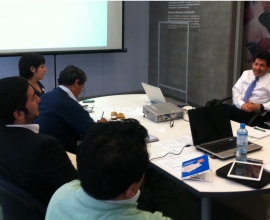Peru introduces the “Education for Employment” area in the full school day of secondary schools.
The technical standards that regulate the area were supported by the European Union's EUROsociAL Programme.
In Peru, adolescents under 18 years of age represent 35% of the country's total population and constitute the generation that will be entering the job market in coming years. Therefore it is important to recognise and strengthen secondary education to train young people capable of facing the demands and opportunities they will encounter in their future. Similarly, there is a need for greater opportunities for adolescents to continue their vocational training or enter the job market.
In this context, the Ministry of Education has proposed the Full School Day, a educational service model that seeks to improve quality by expanding learning opportunities for students at public secondary schools through the addition of another ten hours of teaching to the current curriculum. Implementation of the proposal will start in March 2015 at 1,000 public schools in all regions.
The Full School Day curriculum will dedicate more time to areas such as Mathematics, English, and Vocational Training, among other subjects.
The latter has been reformulated thanks to the support of the Education area of the European Union's EUROsociAL Programme through technical assistance provided by a Mexican expert. This made it possible to define the standards to be used to govern it.
There will be two guiding criteria for Education for Work:
- Development of socio-emotional skills.
- Specific technical training oriented towards demand in the job market, prioritising training on the use of ICTs and computer applications.
For the first criterion, teachers will have to consider the use of teaching-learning strategies that make it possible to experience and develop socio-emotional skills in an integrated manner, giving priority to the development of skills for adapting to change, cooperative work, emotional self-regulation, tolerance, and perseverance. For the second, priority will be given to training modules related to skills that will give students a comprehensive vision of an area's activity or occupational speciality, understand productive processes, and contribute to these processes by applying scientific, technological and artistic knowledge.
Skills for using ICTs and performing "green" activities that respect the environment and utilise socially responsible resources will also be developed.
IILA

